Insights and Commentaries
South East Asia CCS Accelerator (SEACA)
26th May 2023
Introduction
The greatest need for CCS exists in hard to abate sectors, particularly those with process emissions and in economies that rely upon fossil fuels to support their rapid economic growth. Consequently, it is imperative that CCS advances rapidly in Southeast Asia which hosts a significant proportion of the world’s emissions-intense industry and has a growing dependence on fossil energy.
Whilst CCS projects are being developed in this region, gaps in policy, regulation and storage resource development present significant headwinds to reaching FID. In response, the Global CCS Institute created the South East Asia CCS Accelerator (SEACA) initiative to work with governments, multilateral organisations and the private sector to help accelerate investment in carbon capture and storage (CCS) as an essential component of the region’s broader efforts to mitigate climate change. The Institute plans to run three SEACA workshops in 2023/2024.
First SEACA Workshop – Bangkok, Thailand
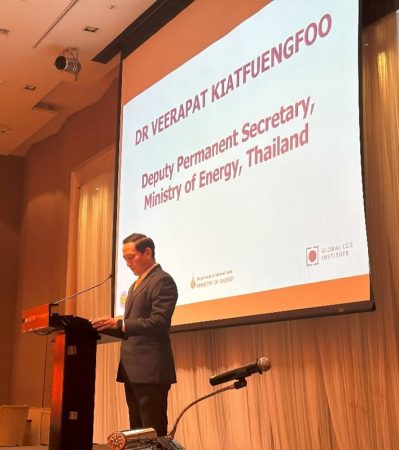
The Institute partnered with the ASEAN Centre for Energy to deliver the first SEACA workshop on 15 and 16 May in Bangkok Thailand. Delegates representing South East Asian governments, the governments of Japan and Australia, project developers, and other stakeholders met to discuss how to accelerate investment in CCS in the region. The workshop was opened by Dr. Veerapat Kiatfuengfoo, Deputy Permanent Secretary, Ministry of Energy Thailand and was supported by the Thai Department of Mineral Fuels.
Prior to the first workshop, the Institute produced three primer reports to seed the discussion, each focused on one of the three pillars of SEACA: CCS regulation, enabling policy, and geological storage resource development.
With respect to South East Asia, these three primer reports:
- Describe the potential role of CCS in achieving net zero emissions using the Institute’s Global Economic Net Zero Optimisation (GENZO) model
- Outline policy options to incentivise investment
- Summarise the status of CCS regulation and its importance to project development
- Present the geological storage capacity of basins in the region
- Identify potential CCS hubs.
Challenges and Opportunities for CCS in South East Asia
Preliminary economic modelling by the Institute (GENZO model) of the least-cost pathway to achieving net-zero emissions reveals a very significant role for CCS in South East Asia, exceeding 3 Gtpa by the year 2065.
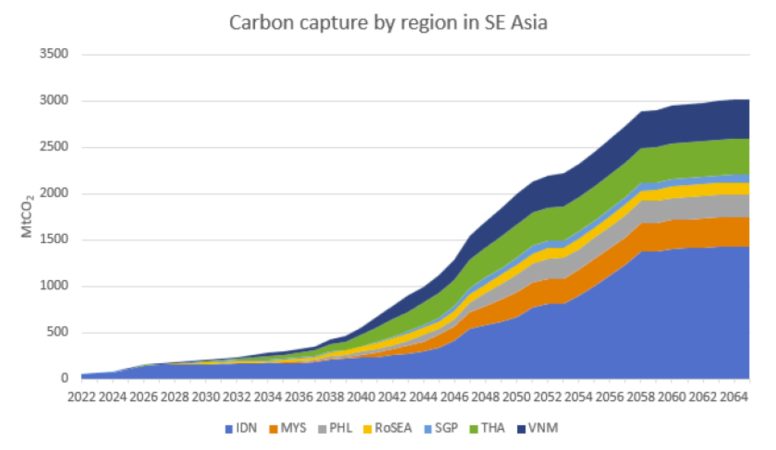
Preliminary Modelling of Carbon Capture by Country in South East Asia – IDN=Indonesia; MYS=Malaysia; PHL=Philippines; SGP=Singapore; THA=Thailand; VNM=Vietnam; RoSEA=Rest of SE Asia
Based on publicly available data, many opportunities for CCS networks, where a cluster of emission sources is located proximate to basins that are suitable for geological storage of CO2 were identified across the region. The figure below shows potential CCS Networks in Indonesia, which has the greatest potential. However, it is clear that South East Asia will require a CO2 shipping network to transport CO2 from nations with no or limited storage resources such as Singapore, for storage in countries that have large storage resources such as Indonesia and Malaysia.
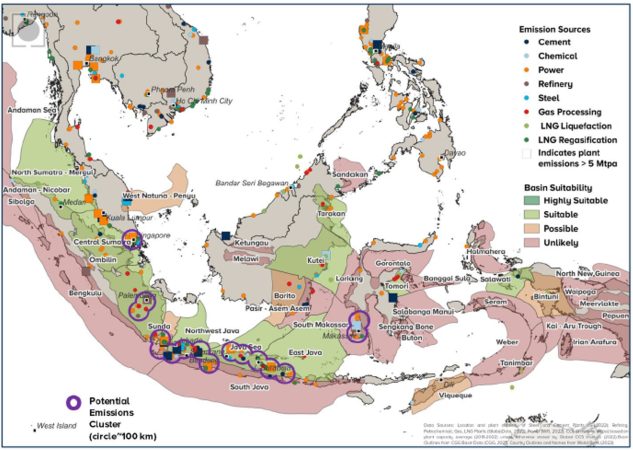 Indonesian Emission Clusters and Storage Basins
Indonesian Emission Clusters and Storage Basins
There are no technical or primary resource constraints which would prevent CCS from playing its full role in supporting the least-cost pathway to net zero emissions in South East Asia. However the policy and regulatory environment is not yet well enough developed to enable investment in CCS projects and infrastructure at the rate and scale that is required to achieve net-zero emissions.
Efficient and transparent regulation that establishes requirements for the appraisal and declaration of storage resources, creates property rights for access to pore space, and defines how liabilities will be managed is a critical enabler of CCS projects. Without it, CCS project developers are exposed to compliance and commercial risks that may prevent project development.
Policies that strengthen the business case for investment in CCS are necessary to mobilise the enormous resources and capabilities of the private sector. CCS projects compete with other investments for capital. Without supportive policies, the private sector will underinvest in CCS and climate targets will not be met.
Policies and agreements between governments are required to enable international trade in carbon dioxide storage services. This is particularly important in South East Asia where some nations have limited storage resources and will require access to pore space in other jurisdictions.
There can be no carbon capture and storage without geological storage resources. The appraisal of storage resources requires essentially the same activities as appraisal of oil or gas reserves, but without the same well-established relationship between investment and return. Development of storage resources is critical to CCS, but also requires policy support and coordinated action to drive the necessary investment at the time the storage resources are required.

South East Asia CCS Policy and Regulation Snapshot
SEACA Workshop 1 Discussion and Outputs
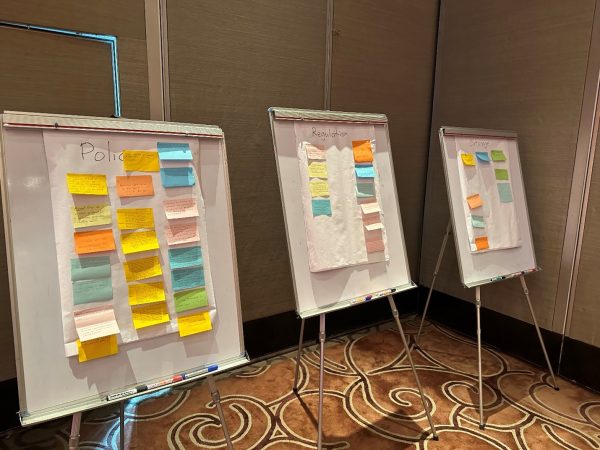
The fundamental question that SEACA is attempting to answer is what can be done to accelerate investment in CCS in South East Asia. This question was posed in the context of each of the three SEACA pillars (policy, regulation, geological storage development) and workshop participants developed a list of potential actions.
Actions ranged from the establishment of working groups on policy, regulation and economic modelling, to completing assessments of current regulations which may be suitable for amendment to regulate CCS to organizing a series of engagements for south east Asian policy makers and regulators to access operating CCS facilities and speak with their regulators and independent experts, to creating a geological data discovery initiative drawing upon national geological surveys including seeking aggregated data from oil/gas companies on dry well, and more.
The next step is to distill this long list into a draft workplan and seek support for its implementation from relevant stakeholders. The Institute will complete that task prior to the next SEACA workshop, tentatively scheduled for mid-November 2023 in Jakarta Indonesia.
Conclusion
The first SEACA workshop demonstrated the potential for CCS in South East Asia, and the willingness of governments and project developers to come together to discuss how this essential technology can be deployed in support of achieving net-zero emissions. A clear conclusion from the discussion is that success can only be achieved through active collaboration between the public and private sectors. Waiting for the market to deliver CCS, without a strategy, without cooperation between governments and project developers, or without the necessary interventions will not achieve the scale of deployment required to meet climate goals.
SEACA is facilitating discussions and collaboration between stakeholders, will develop a plan of action, and where appropriate coordinate the implementation of those actions. The first workshop fully met its objectives of beginning the process of defining that action plan. But the greater challenge lies ahead: recruiting support for the implementation of those actions and then delivery.
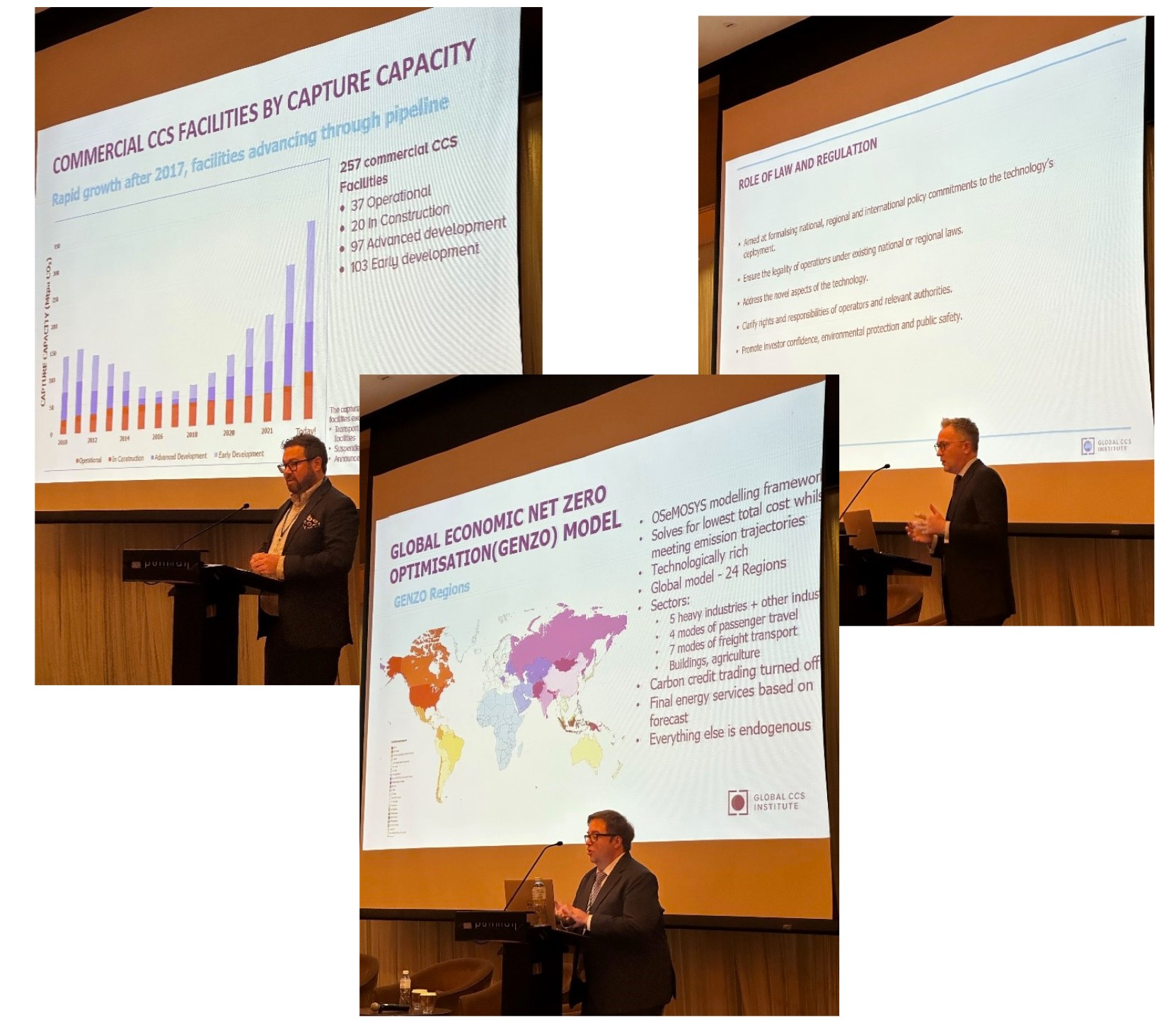
This piece was written by Alex Zapantis, General Manager, Commercial with the Global CCS Institute